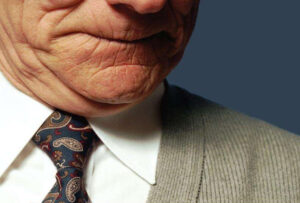
On our two year anniversary, and to celebrate another year of voicing opinion, we asked our new reviewers to tell us a bit about how, when and why they came to write / review poetry, and what they do when they just can’t get on with writing a poem or a Friday Poem review.
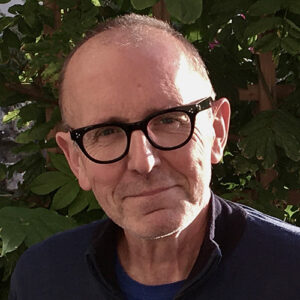
Beginnings and favourites. I enjoyed Keats at O ‘Level, but not as much as Maths and Physics. The first poetry I fell hard for, when I was about 13, was Paul Simon’s: “I hear the drizzle of the rain / Like a memory it falls…”. A few years later, the dazzle of Clive James’s Observer TV critiques led me to his song lyrics for Pete Atkin: “And here is all these people have / and everything they can’t believe / the beach the poor men never reach / the shore the rich men never leave”; or this: “Touch has a memory / better than the other senses / Hearing and sight fight free / touching has no defences”, which points us back to Keats.
I’m not sure what sort of poetry I prefer. “What kinds of poetry are there?”, asks the protagonist in in Ben Lerner’s Leaving the Atocha Station when asked what kind he writes. What I know is that I love some, and would hate to be without it, whereas most does little for me. Gamblers will persist for longer on a one-armed bandit that pays out less regularly (studies have shown). It’s like that for me with contemporary poetry: I feed my token and pull the handle. Nothing. I’m on the point of quitting when coins jump from the machine and cover my shoes. Usually there’s some wit on show, sometimes some form. I admire clarity and vivid meaning, I relish the reflection that follows the reading, and the re-reading to uncover the tricks. Let me mention some writers whose every collection I’ve tracked down and bought: Kay Ryan, Connie Wanek, Louis Jenkins, Jeffrey Harrison. Among the more celebrated Brits, give me Hugo Williams and Christopher Reid. I owe Michael Laskey, but I’d love his poems if I didn’t.
With the low payoff rates of the poetry fruit machine, it’s easy to let your attention lapse, and not to give poems their due. Reviewing keeps me honest in this regard, though I prefer to review books about which I have some inkling of admiration in advance. Poems ask to be closely read, and too few are, so it feels like a service to a community, even if the real motives are more selfish.
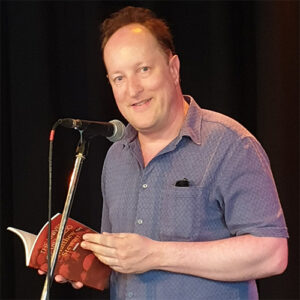
Throughout my childhood and teenage years, I wrote across several genres. It wasn’t till my second year at university that I began to realise the best bits of my prose were already fighting to be poems, while brevity wasn’t just a forte but a necessity for me. At that point, poetry took over.
Essay writing at school, college and then university formed my first experience of writing about other poets’ work. However, over the years, I found academic criticism was draining the life from my enjoyment of poetry. That’s why the process of starting to write reviews on my blog, Rogue Strands, in about 2009, became an ideal way to re-engage with poems and their potential readers, layering a rigorous approach with the pure relish of sharing stuff I love. For me, the best part of reviewing is when someone buys a book and finds pleasure in it on the back of my piece.
And as for the issue of what displacement activities I indulge in when I should be writing, I’m afraid my personal experience is the opposite: writing poetry is actually my displacement activity when I should really be doing all sorts of other things that spell R-E-S-P-O-N-S-I-B-I-L-I-T-Y! Which is another reason why I’d never want to turn poetry into my job – doing so would kill my writing overnight.
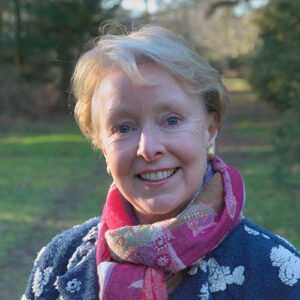
For my seventh birthday my mum gave me The Golden Treasury of Poetry, selected and with a commentary by Louis Untermeyer, illustrated by Joan Walsh Anglund. It was probably the best 21 shillings my mum spent on me. I still have that book, with my name written in spidery joined-up writing, inside both front and back covers! Here I met William Blake, Emily Dickinson, Robert Frost, Ogden Nash, T. S. Eliot, Eleanor Farjeon, Lewis Carroll, Edward Lear, Gerard Manley Hopkins, E. E. Cummings, John Clare, and so many others who would become lifelong favourites.
At school I was lucky to be taught by a young teacher who was passionate about poetry – she fascinated me by turning red from the neck upwards as she recited Shakespeare and Donne in class. Studying English at Cambridge, I devoured Edward Thomas’s work in the days before he was lauded, and I read a lot of American poetry too.
One of my favourite poems is Seamus Heaney’s ‘Postscript’, but I wouldn’t be able to pick out one line. The whole poem feels like one line, a single flowing thought.
Reviewing is part of my way of living with poetry. I love the moment of committing to writing a review, knowing I’ll read the book closely, over and over, and read around it too. It’s a privilege to give time to thinking deeply about a book and then articulating a written response. I like the challenge of reviewing books I might not otherwise find, as well as books I’d definitely want to read.
I spend time looking out of the window when I’m thinking about writing, or when I’m putting off writing – but I’ve learned this is necessary, so I try not to limit myself!
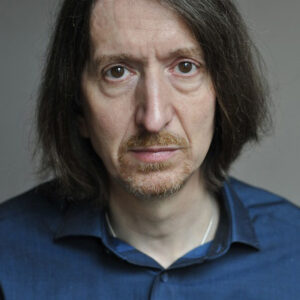
My journey into writing poetry as an adult wasn’t straightforward. I’d written a lot as a child, albeit mainly stories – I think this is reflected in how often even my shorter poems carry a strong narrative drive. I stopped writing creatively in my teens, and lost the ability to write prose easily about halfway through my degree. I started writing poetry seriously in my late 30s; it helped me deal with a major upheaval in my life, and was a way to connect back to an abandoned part of me, the part that both loves and has a facility for the act of putting words together in an engaging way.
I don’t tend to write formal reviews very often, though for the past ten years I’ve often done what I call micro-blogging, where I write an extended post for my Facebook page on a particular poem or collection that I’ve been reading. I think that whenever I write prose about poetry I’m aiming to draw people’s attention to something in a writer’s work – whether it’s an individual poem, or a theme running through a collection – that might have escaped people’s notice. I want to offer some kind of fresh perspective, in the hope that it sends the reader back to the text in question, which I think should be the basic aim of any critical writing on poetry. Also, whatever perspective I have needs to be grounded in the way the writer is shaping language – how are they using the resources of rhythm and sound, how are they breaking the line, are their images truly working in the service of the poem? A single line that acts as a good example of all this for me would be the opening of ‘Morning Song’ by Sylvia Plath – “Love set you going like a fat gold watch.”
I wish I could remember which European writer it was who said that the only thing they hated more than writing was not writing. This is definitely true for me with prose – poems, in contrast, tend to push just about everything else out of the way when they arrive. My distractions are many and varied, although YouTube and the websites for The Guardian and ESPN Cricinfo feature prominently. I’m fortunate in that I have a 50-minute there-and-back walk through green space right on my doorstep, and taking advantage of that is the best way to ensure that I’ll actually write something when I’m back at my desk.

I learned to appreciate poetry at school in Cork. Work by Yeats, Eliot, Dylan Thomas, Patrick Kavanagh, Thomas Kinsella, and Seán Ó Ríordáin was particularly inspirational. Outside of school my interest gravitated towards Leonard Cohen’s poetry, and I still find pleasure in returning to his early collections: Let Us Compare Mythologies, The Spice-Box of Earth, and Flowers for Hitler. As to favourite lines of poetry, what come to mind are lines by Coleridge, “In Xanadu did Kubla Khan / A stately pleasure-dome decree: / Where Alph, the sacred river, ran / Through caverns measureless to man / Down to a sunless sea.”; and Joyce Mansour, “Offer your throat to the night / Obsessive Africa / Spit your teeth your waste / Your dizziness / In the whipped cream / Of the church”.
I enjoy poetry of all varieties but tend to prefer the more experimental approaches. I often find Surrealist and Beat poetry more rewarding than more mainstream narrative or confessional work. But one of the benefits of reviewing poetry is that it involves a concentration on contextual merit irrespective of genre, and this encourages me towards remaining appreciative of all styles. In 2017 I broke through a long-standing creative block by beginning an enduring practice of writing haiku, so I also read a lot of haiku and related Japanese forms.
My reviewing career progressed from haiku books to poetry pamphlets to full-length collections. Reviewing poetry involves a type of intense reading and concentrated analysis that I feel improves my own creative writing, and the reviewing process, when conducted respectfully and constructively, also hopefully benefits the reviewed author and the broader poetry community.
My displacement activities when I should be writing long form poetry are writing haiku and reviews. When I’m trying to write and failing completely, I generally spend time walking, running, reading, painting, and playing chess.
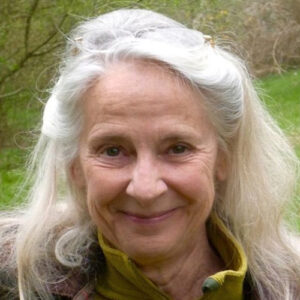
I’m a reader of poetry, and, since you can never trust a cover blurb, I’m a reader of reviews too. Without the prompt of someone else’s enthusiasm for a new book’s intelligence, grace, wit, formal skill or whatever, I’d probably just keep filling my shelves with old favourites like August Kleinzahler and Charles Wright.
So reviewing feels a bit like pay-back for reviews I read myself. There are no financial benefits to reviewing (lumbering yourself with deadlines and care for unknown writers’ sensitivities) but there are other benefits, the most significant being that it makes me a better reader. I have to read more deeply, try to understand what a writer’s aiming for – there’s no quick dip and putting aside when I need to write about it. There’s also the surprise of finding delight in something that’s ‘not my sort of thing’, and of keeping up with books and pamphlets and publishers I wouldn’t otherwise have come across.
I’ll usually read a book straight through a couple of times, then leave it a good while for ideas to settle before I re-read several times, framing ideas about it, making notes, finding quotes – I think these important in allowing the author’s own voice to come through. (Mind you, I do sometimes wonder whether anyone other than its author and publisher ever reads a book review).
My displacement activity when I should be writing? I think it’s the other way round for me – writing’s the displacement activity when I should be working outdoors!
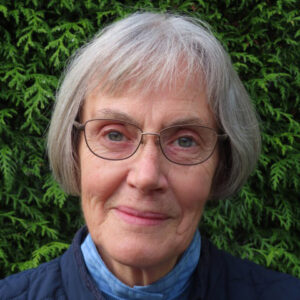
Rhyme and rhythm: the rhyming couplets in the Rupert Bear annuals, knowing The Pied Piper of Hamelin by heart when I was four, a second-hand Arthur Mee’s Children’s Encyclopaedia (all 10 volumes). Traditional stuff. Choral verse speaking at school, 44 of us – classes were large in those day – belting out ‘Macavity: The Mystery Cat’. Then The Faber Book of Comic Verse as a school prize, showing me what fun pastiche could be when it overturned the classics. I wish I could claim a more impressive pedigree.
New poetry hadn’t reached my school (or teachers) so R.S.Thomas’ ‘Welsh Testament’ as the A-level unseen was a revelation. I bought Penguin Modern Poets Vol 1 (July 1964 in my school-girl hand). That was a landmark.
Light verse was inevitable. ‘Proper’ poetry was for greater minds so I entered by the back door – New Statesman and The Spectator weekly competitions. I met like-minded scribblers: my tribe, at last, and still a happy distraction. You can hide in light verse, and find yourself too. It’s the best place to rant about politics.
The Poetry Library was my salvation: so many magazines! New poets and poetry to explore. And the librarians didn’t throw me out but accepted that I was just like them. One scrap that haunts me is Larkin’s “… the uncaring / intricate rented world …” (from ‘Aubade’). He predicted the twenty-first century there.
With poems appearing in the small magazines I was offered a chance to review for a local newsletter: of course! I was flattered. But writing that review taught me how much I didn’t know, and I’ve been learning ever since. Reviewing takes me into new writing, keeps me curious, makes me write as accurately as I can about why / how poetry achieves what it does, and how it is always, always changing.
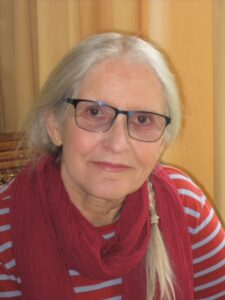
I write reviews for pleasure and to broaden my reading, but I only review collections I like. At seventy-two, life’s too short to dwell on poems I don’t enjoy or can’t understand, or which other reviewers might be better equipped to appreciate. Having said that, I often find myself coming round to a collection I’m initially unsure about once I’ve lived with it for a while. The big plus for me about writing reviews is that it makes me slow down, whereas my natural tendency might be to turn the page and avoid the challenge.
My favourite living poet is John Burnside*, and my favourite dead one is R.S. Thomas. I also like quirky or surreal poets such as Stevie Smith, Selima Hill, Charles Simic and Luke Kennard, and poets who combine humour and seriousness, like Kit Wright, Wendy Cope or Caroline Bird.
I have a particular interest in children’s poetry and admire its honesty, positivity and anarchy. There are some excellent poets writing for children at the moment. Kate Wakeling is just one name to watch. Children’s poetry is becoming much more varied and experimental, but has not yet abandoned rhythm, rhyme and traditional forms, all of which I enjoy.
I listen out for good rhymes in pop songs. ‘Up the Junction’ by Squeeze has always delighted me with its rhymes and half-rhymes: happen / the girl from Clapham; forgiveness / not my business; incubator / minutes later; my assumption / up the junction.
When I’m not doing poetry-related things, I like to walk the local lanes and see how many birds I can spot or hear. There are fewer birds round here than there used to be, so it lifts my heart to hear a song thrush or a chiff chaff. Hope is the thing with feathers!
* This was written prior to John Burnside’s death on 29th May 2024.
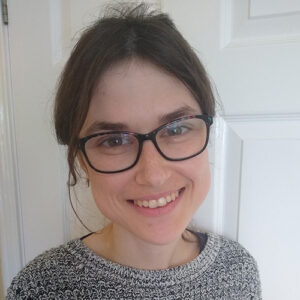
When I was two years old I wanted to be a bus driver or an orchestra conductor – the latter because I wanted to wave my arms about a lot. By the time I was four, my ambitions had matured – I wanted to be an “artist, actress, writer or musician”. As I told people this, I could practically hear the applause and see myself taking a deep and impressive bow.
I did end up becoming a writer of sorts – though this is still a work in progress – and studied Creative Writing as an undergraduate and for a Masters, with a focus on poetry. I like a lot of different poets, but perhaps one of the first people whose poetry deeply moved me was Gerard Manley Hopkins. When I read ‘The Windhover’, I felt myself gripped by its strange and taut tension. I soared alongside the “dapple-dawn-drawn Falcon, in his riding / Of the rolling level underneath him steady air”.
Reviewing, for me, fulfils several purposes. Firstly, I think it makes me a better reader. When I know I’m going to review something, I concentrate more on the way individual poems and a whole collection is put together. Secondly, I think it makes me a better writer. Reviewing helps me to keep abreast of what is happening in the poetry world and gives me ideas for my own work. Finally – and this is the main reason why I want to review – I love the idea of paying proper attention to a poet’s work and doing their art justice. I always get a thrill when a writer shares or comments online on a review I have written of their work. It’s nice to think that you are supporting other poets and helping them to see that their hard work and talent is recognised, appreciated and very much needed.
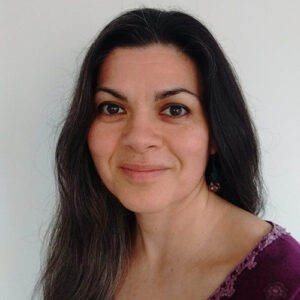
I’ve been writing poetry since I was a kid, and was awarded a literary shield when I was nine. I am not sure if that cemented the bug but I grew up adoring books and being delighted by rhyme. In my teens I encountered the war poets in English classes at school – Wilfred Owen, Siegfried Sassoon. I was intrigued by the imagery in Ozymandias by Percy Shelley. I loved the heightened imagery, compactness and mystery of poetry. Later, I started to encounter work that didn’t make the school curriculum – the majestic poetry of Maya Angelou, the phenomenal Benjamin Zephaniah and the Liverpudlian gem who is Levi Tafari.
I fell out of reading and writing poetry for a long time because of my day job and having a family. But when my kids were small I somehow found my way back to those delicious stanzas, and earnestly read again. This love of poetry eventually led to my pursuing a Masters in Creative Writing and Poetry at Manchester Metropolitan University. Reading poetry became a welcome obsession and over time, I have found wonder and nourishment in the work of my tutors at Manchester, and also blissful travel through the work of Gillian Clarke, Carol Ann Duffy, Vicki Feaver, Kae Tempest, Raymond Antrobus, Kathleen Jamie and Rupi Kaur. There are so many wonderful poets out there, these are just a handful!
I have loved the opportunity to review for The Friday Poem. It gives me a chance to encounter new work, from poets I don’t know. The act of reviewing makes me read differently. I pay much more careful attention to the work, and spend more time with the collections, reading and re-reading. I sometimes cross check references, or look more into the symbolism of what is being said. I try to understand something of the context that the poet is writing in. It feels intimate and also journalistic, but I love trying to get close to the intention of the poet, whilst noting the work’s impact on me. I understand that curating a collection takes time and careful, sometimes, painstaking, decision-making. I want to decode, to try to understand, and to do the work justice. It is like going on a wonderful journey through an emotional landscape, someone else’s interior. That deserves treading with respectful honesty. If you are lucky enough to be invited to review for FriP, embrace it, because it’s joyous!
Outside of reviewing poetry, and a busy day job, I enjoy drinking in our precious natural landscapes and seeking solace in birdsong. For less earnest pursuits, I love a good cuppa and crap telly.
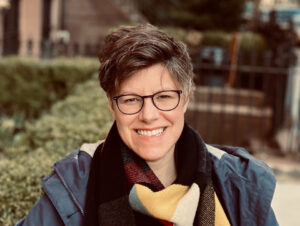
If you widen the definition of poetry to include what’s thinkable and worded but unspoken, I’ve always made poems. As a child I was in a secret relationship with an imagined internal reader, containing and benign. Through necessity, my mind had become my own mother. I was a gay kid grappling with “who am I?” long before I began to contemplate “what happened to me?”
Less interesting to me is how I swallowed actual poetic pieces of the canon fed to me in manageable chunks at school. I remember two moments from the white British men on offer: the alliterative erotics of D H Lawrence’s ‘Snake’, and the permission to condense darkness (“blood-shod”) given by Wilfred Owen. Sex and death at eleven.
I’m drawn to poets who know survival and othering and the alchemical joy of creating with it. Ocean Vuong and Natalie Diaz now … Lorde and Rich then. And I wait impatiently for any new work by Philip Gross and Jack Underwood. My mind goes blank when I try to think of a favourite line. It’s like asking me to choose a favourite hair on my daughter’s head.
My poetry reviewing is done through a psychoanalytic lens which I can’t switch off. For me, it’s a humanistic not a diagnostic way of seeing. If I can make associations, tune into unconscious echoes, turn over and lift up lines of beautiful devastating economy, all to the good.
In these early years of motherhood, I’m not writing down my own poetry. My daughter is too young to write, and I’m not drawn to her as a subject now she’s here. My pandemic pamphlet is a non-linear thread of the dream of her. She loves to paint, and I paint with her. When she sleeps (and dreams) I review poetry. Slowly and gratefully.

